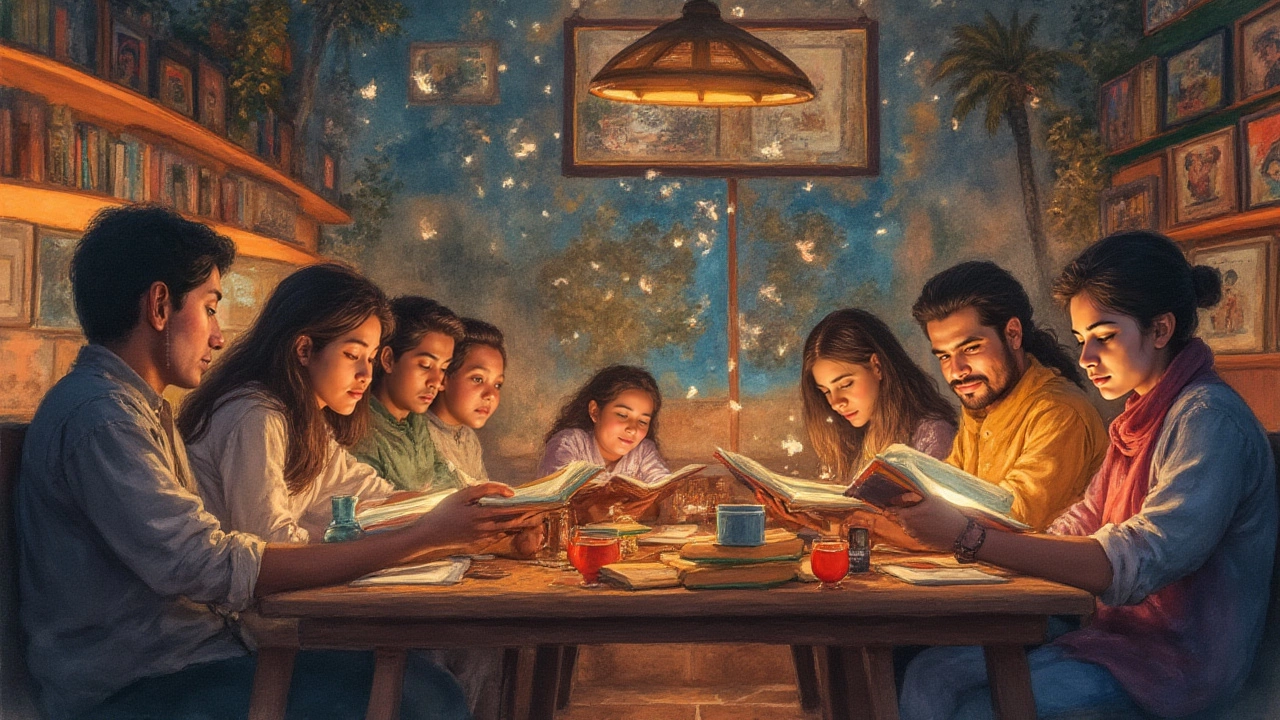Can a single book flip your entire world upside down? Imagine waking up one morning, picking up a book almost on a whim, and then, within a few hours or days, realizing you’ll never be the same again. That’s not just poetic talk—it’s happened to people, myself included. My friend Jamie ditched a desk job after finishing Viktor Frankl’s “Man’s Search for Meaning.” My neighbor, Linda, got into marathon running because she read Christopher McDougall’s “Born to Run.” The right book, at just the right time, doesn’t gently nudge you toward change. Sometimes, it shoves you hard right into a brand-new way of being.
What Makes a Book Capable of Changing Your Life?
You might picture thick books with dusty covers and tough, philosophical language when people talk about life-changing reads. But the truth is way less predictable. Sometimes it’s a novel, a simple memoir, or even a kids’ story that hits you right in the gut. That spark—where you suddenly see your world differently—comes from a mix of timing, raw honesty, and the feeling that the author sees something inside you, even if you’ve never met.
Why do some books hit harder than others? Scientists from the University of Toronto ran a study where participants read fiction and nonfiction, then tracked mood and behavior shifts. Fiction, especially with flawed or complex characters, left people more empathetic and open-minded for days. That’s not random. When a story mirrors your mess, your struggles, or desires—even if it’s wrapped in wizard cloaks or set on another planet—your brain lights up like Times Square. It’s like the author’s whispering, "Hey, your story matters too." That feeling unlocks courage, and suddenly you start rethinking what’s possible.
One common thread is vulnerability. Memoirs like Tara Westover’s “Educated” pack a punch because they lay it all on the line—every fear, failure, and ugly truth. When someone’s that raw, you can’t help but see pieces of yourself. The science is cool, but honestly, sometimes you just know in your gut—two pages in, and you’re reevaluating the last ten years of your life.
This isn’t just about self-help, either. Sometimes a fast-paced thriller shakes loose buried dreams, or a sci-fi book plants seeds of hope you never knew you needed. If you find yourself obsessively quoting lines to your friends, losing sleep to keep reading, or suddenly itching to try something new, your life is tilting on its axis. That’s what separates a good book from a life-changing one.
Unexpected Titles That People Swear Changed Their Lives
Ask five friends about the book that rewired their inner circuits and you’ll rarely get the same answer twice. Sure, there are classics that come up a lot—like “To Kill a Mockingbird” or “1984”—but there’s no cookie-cutter favorite for everyone. A few stories stand out, though, not because they won the biggest awards, but because real people credit them with real change.
“Atomic Habits” by James Clear isn’t just another productivity book. Almost every page packs a tip you can actually use—like stacking a new habit onto something routine (drink coffee, then meditate for two minutes). People around Sydney use this book as a wake-up call to ditch perfectionism and start small. Sometimes I’ll bump into a neighbor at the gym and hear them repeat, “Tiny changes, remarkable results,” as if it’s become their mantra. Turns out, repetition like that can literally rewire your brain pathways, according to recent neuroscience research from Monash University.
Now, if someone feels lost or broken, “The Alchemist” by Paulo Coelho sneaks onto their radar. This isn’t slick prose or complicated philosophy. It’s a gentle nudge telling you it’s OK to chase what you want, even if it sounds impossible. One Sydney barista told me she read it during a rough patch and walked away with plans to open her own bakery.
Less famous but just as weirdly powerful: “Quiet: The Power of Introverts in a World That Can’t Stop Talking” by Susan Cain. If you ever felt too shy or overlooked, this book hands you a badge of honor and a toolkit to thrive, not just survive. It made introverts everywhere (myself included) realize soft spoken isn’t weak—it’s another kind of powerful.
Even novels get a look-in. “Never Let Me Go” by Kazuo Ishiguro spins you into an emotional loop, forcing you to question what really matters. After reading it, a friend told me they started calling old friends more often because suddenly, time felt precious.
The thing is, it doesn’t always matter what book you pick up. It’s about where you are in life and what you need at that exact moment. Some people find their game-changer buried in a dollar bin at the second-hand shop, while others find it hiding in the literary canon. The magic isn’t in the title. It’s in how that book fits the shape of the hole in your own story.

Tips for Finding the Book That Will Change You
If picking a book felt as high-stakes as picking a soulmate, you’re not alone. The good news: the process can be a lot less stressful—and way more fun. It starts with asking one simple question: what isn’t working in your life right now? Be honest. If you keep hitting the same wall, crave adventure, or feel stuck in a rut, target books that could chip away at that specific trouble spot.
Here’s a practical hack: mimic what you’d do at a new restaurant. Don’t just order the usual. Scan the shelves for something different. That means testing genres you normally skip. Love thrillers? Try a memoir. Prefer history? Go for contemporary fiction. Branching out can work wonders. A study done by the Australian Reading Hour group found that people who purposely switched genres reported bigger personal “aha!” moments, with some even shifting careers as a result.
Don’t underestimate crowdsourced magic. Goodreads and Reddit are goldmines for finding the books that transformed total strangers. Search things like “the book that changed my life,” then see which titles pop up repeatedly. If you spot a pattern, that’s a good sign. You can also ask three trusted friends; chances are you’ll spot a trend you never expected.
If you’re the kind to overthink reviews, stop. Even the most famous books have die-hard detractors. What matters is if a story grabs you, not what an anonymous critic thinks. When you find something intriguing, read the first 10 pages. If it feels like coming home—or scaring you into motion—don’t overthink. Commit.
Don’t forget places like libraries and secondhand stores. Sometimes the book you need is the one you stumble on accidentally, wedged between two genres you’d never mix (I once found a battered copy of “The Subtle Art of Not Giving a F*ck” next to a gardening manual—true story). If money’s tight, e-book deals, library apps like Libby, and little free libraries dotted around Sydney make it easy to take a chance on an unknown author.
Here’s another tip—read the acknowledgements. Authors often spill the names of books and people who shaped them. Follow that trail, and you might find a hidden connection.
If you're really stuck, book clubs often push you off your safe perch. When Delia joined her first club, she got shamed into reading “A Little Life” by Hanya Yanagihara—a thousand emotional punches later, she said it forced her to rethink friendship, pain, and empathy. Peer pressure isn’t always a bad thing.
The Personal Journey: When Books Get Under Your Skin
Picture this: It’s the middle of the night, rain tapping the window, and you’re holding a book so tight your knuckles ache. You know you should sleep, but you can’t stop. That’s when you realize you’re not just reading—you’re changing. Words have climbed inside your head and started rearranging the furniture.
That’s what happened to me with “Sapiens” by Yuval Noah Harari. This wasn’t just about history. Suddenly, I saw how every decision I made—what I bought, what I believed—fit into a gigantic, messy puzzle. I started living lighter, thinking harder, questioning old habits. Even Delia noticed I was different. Books can do that. They worm their way under your skin, offer up new paths, and sometimes crack open windows you didn’t know existed.
It’s worth remembering the process isn’t always smooth. Change, even welcome change, is uncomfortable. Books that wreck you aren’t always joyful. Sometimes they force ugly truths into daylight. After reading “This Is Going To Hurt” by Adam Kay—a brutal but hilarious look at life as a doctor—one of my mates left medicine, swearing he’d never go back. But he was happier for it.
Also, don’t worry if someone else’s life-changer leaves you cold. Timing is everything. The book that explodes one person’s world might fizzle for another. If a novel makes you cry on the train or a memoir inspires you to finally quit a bad job, pay attention. Your life-changing book can show up where you're least expecting—sometimes hiding in a story you almost put back on the shelf.
So when you pick up a book next, ask yourself: is this sticking with me because it’s just clever—or because it’s quietly daring me to change? If the latter, buckle up. That’s the life-changing book people are always talking about—but it’s different for each of us. The best advice? Keep reading until you find the one that feels like it was waiting just for you.

